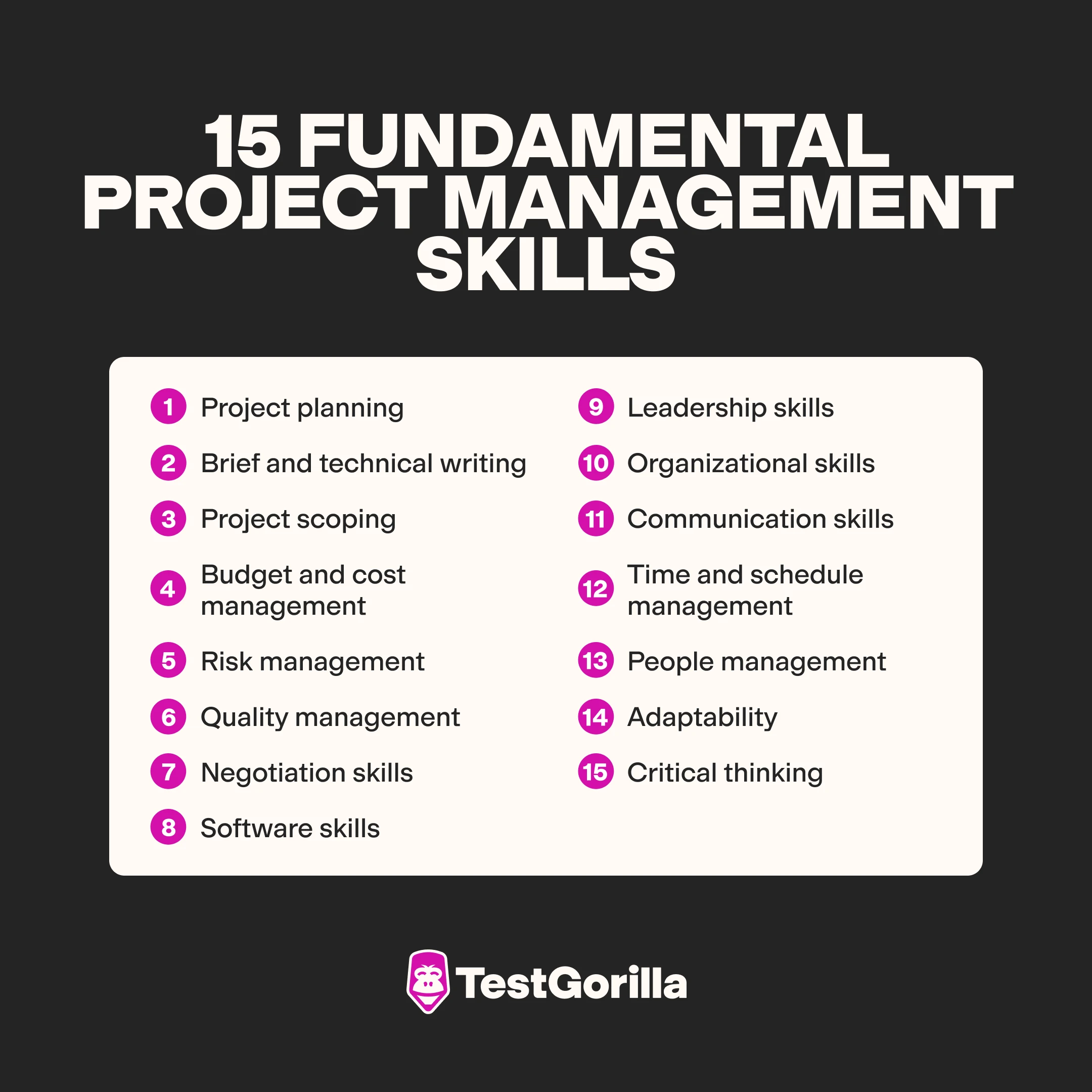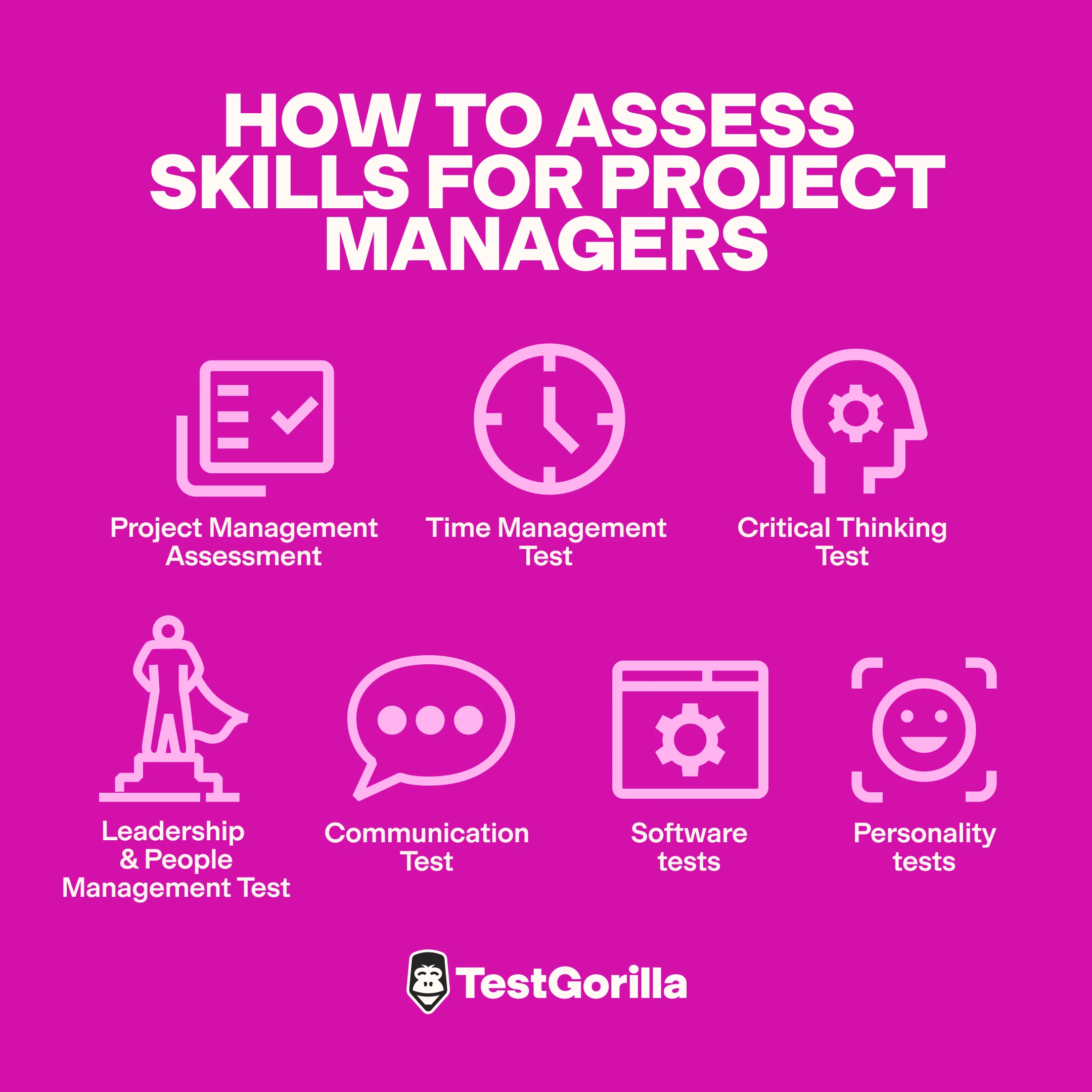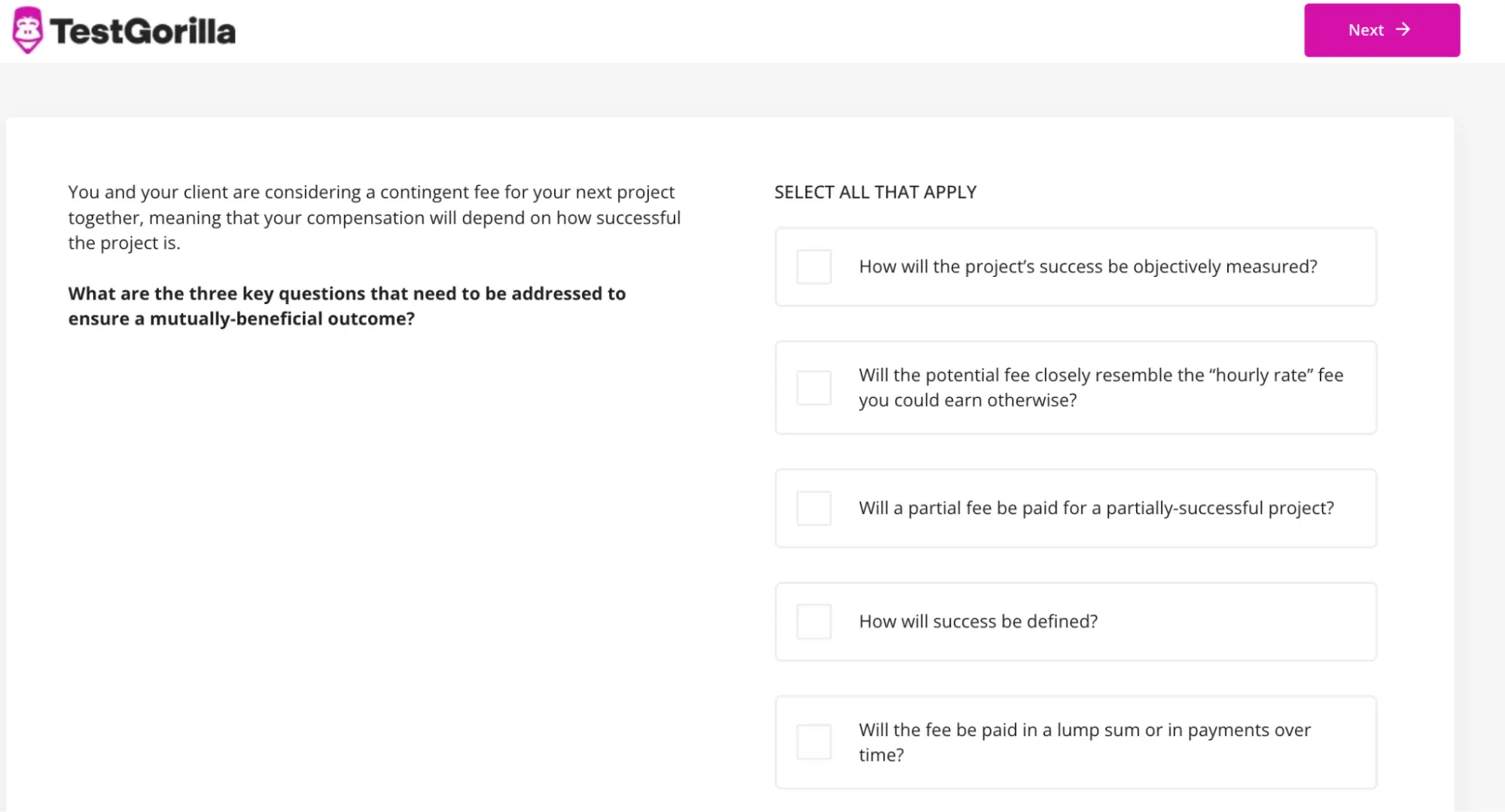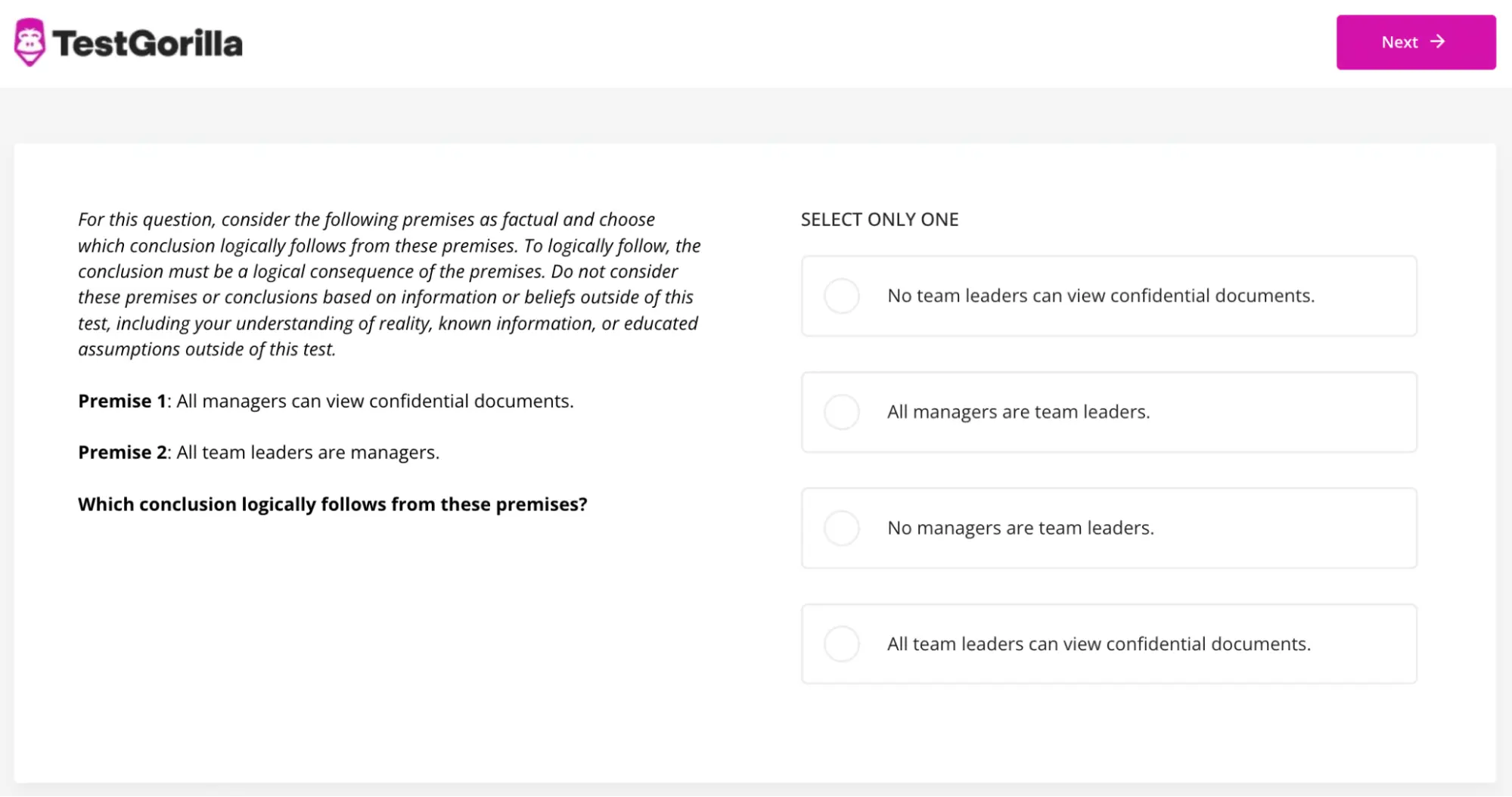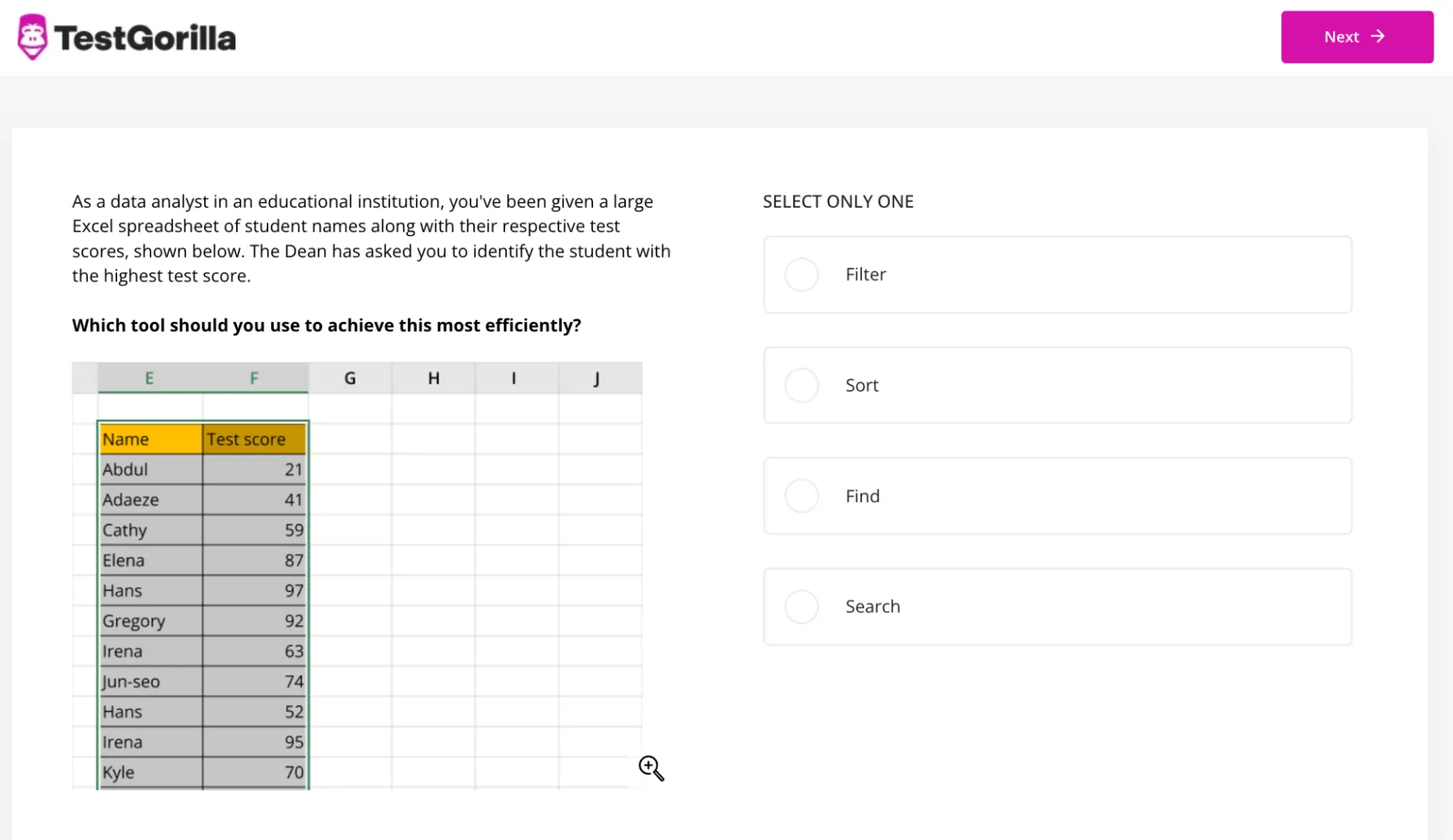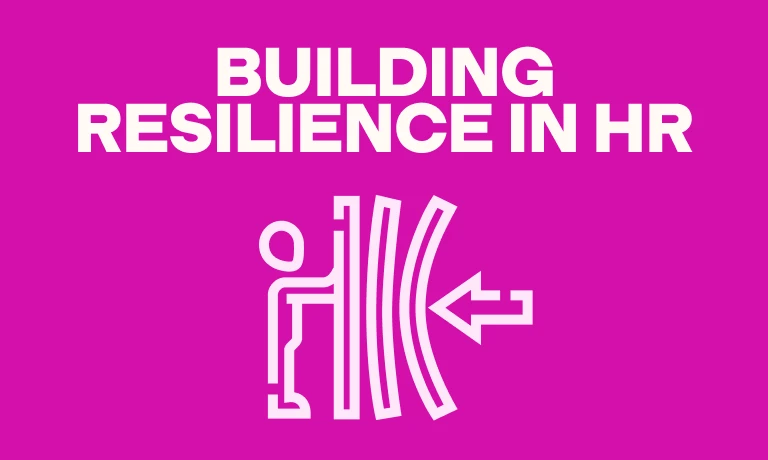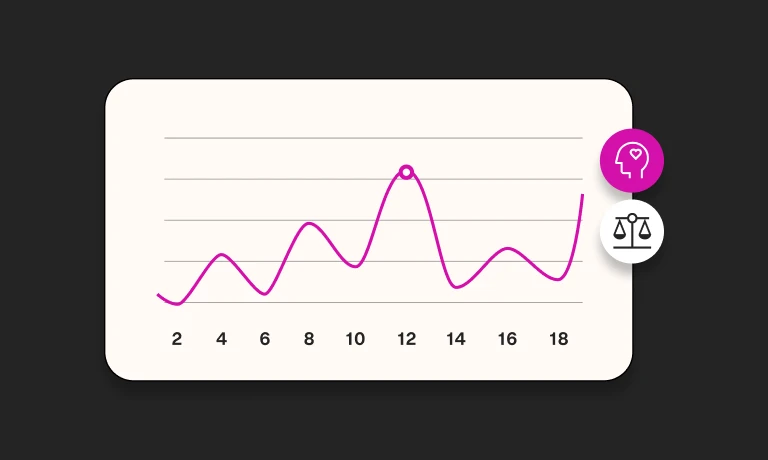Hire more highly skilled project managers
Project managers are some of the hardest-working people around. After all, they juggle deadlines, budgets, and even people.
The best project managers are self-starting, organized, confident, and great at communicating. However, that’s not always easy to spot when hiring purely on resumes.
Recruiters who test for project management skills are more likely to find creative, proactive talent faster than anyone else.
In this guide, we show you:
The most important project manager competencies
How to test key project management skills
How to develop these traits
15 fundamental project management skills and competencies
Many HR departments rely on resumes and experience checks when hiring a project manager.
What if, however, the perfect candidate with all the essential project management skills simply doesn’t have the experience they’re looking for? They get passed over – that’s hardly fair.
Hands-on experience is important for any job, especially a project management role. However, that experience can come from any number of sources, many of which don’t translate well to on-paper work experience.
It’s on recruiters to find the best possible talent based on skills rather than experience. After all, around 11.4% of project investment gets wasted because of poor performance.
All the more reason, then, to prioritize the following project management skills and competencies:
Project planning
Brief and technical writing
Project scoping
Budget and cost management
Risk management
Quality management
Negotiation skills
Software skills
Leadership skills
Organizational skills
Communication skills
Time and schedule management
People management
Adaptability
Critical thinking
Let’s explore these in more detail.
1. Project planning
Project planning is all about managing budgets, setting clear goals, and understanding where different people make up the bigger picture.
It’s here where good project managers need to include the following in their plans:
Details on roles and responsibilities
Budget required
Project scope
Checkpoints and milestones
Timeline and workflow
Goal metrics
Communication points
Top project managers are comfortable with creating plans to establish what success looks like in practice. This can be challenging and take a lot of educated guessing and critical thinking.
2. Brief and technical writing
Brief and technical writing in project management means simplifying complex details so everyone on the project team understands them.
A project manager’s job involves writing overviews, reports, and analyses in such a way that keeps everyone on the same page.
Talented project managers aren’t afraid to dive into the details and think objectively about what to present and how.
Brief and technical writing skills require good attention to detail, effective communication and interpersonal skills, and the ability to break down data.
3. Project scoping
Scope creep occurs when projects keep changing and growing out of control, often leading to missed deadlines, increased costs, and team conflicts.
Around half of all projects suffer from scope creep. All the more reason, then, to hire a PM with project-scoping skills.
PMs with project-scoping skills are keen researchers. They’re not afraid to dive deep into details and communicate with others to set limits and establish project goals.
Project scoping continues long after projects start, too. PMs can use points of reference to rein in projects and deny requests.
4. Budget and cost management
Without budgeting, projects are doomed to rack up costs until delivery.
Look at the financial problems facing megaprojects in the construction industry – around 98% of these projects overrun their budgets by at least 30%!
Therefore, talented budgeters are highly sought-after. To keep costs down, project managers need to:
Carefully allocate money to different project areas
Negotiate budget needs with business leaders
Manage scope creep with clear boundaries
Plan projects within the company’s financial means
Set clear checkpoints to review spending
5. Risk management
All projects carry potential risks, whether unseen costs, time delays, or health and safety concerns.
Project managers should create clear risk templates and forecast the potential worst-case scenarios for each action or checkpoint.
They need to ask themselves:
What risks are likely to occur?
What’s the worst possible impact of these risks?
What is our response to this impact?
How can we mitigate these risks from happening?
Who is responsible for overseeing the risk area?
6. Quality management
Project managers must balance quality and timely delivery, which means they need to assess progress at milestones.
That could mean ensuring a software developer’s code works as expected or that a construction project is safe and fit for purpose.
Measuring quality across projects is a constant process, which means PMs might need to check in on their teams by using:
Internal audits and evaluations
Checklists
Charts, such as pie, flow, and Gantt charts
Benchmarking deliverables to industry standards
A PM with exceptional quality control skills:
Shows attention to detail, meticulously checking work
Provides constructive feedback and support
Creates templates and guides to help people stay on track
Regularly checks in with teams without micromanaging
7. Negotiation skills
Project managers negotiate with project stakeholders, team members, and suppliers to achieve the best results.
Therefore, negotiating means coming up with resolutions that are fair and help the project move forward with minimal disruption.
A project manager might find stakeholders pushing scope creep or employees asking for more budget leeway. Sometimes, that means having to say “no” with diplomacy and presenting counteroffers. Is there a way to combine stakeholder requests without increasing budget and effort?
Negotiators are comfortable handling conflict resolution. They communicate clearly and aren’t afraid to think outside the box.
8. Software skills
A PM uses all kinds of project management tools to get projects moving in the right direction.
Project management software such as Microsoft Project, Kanban, Wrike, and Basecamp help PMs track the project roadmap, assign tasks, and monitor team performance.
Many use Google Docs to share templates and feedback or Microsoft Excel to build budgets and charts.
Software-savvy PMs are quick and eager to learn how to use different tools, explore features independently, and think critically about how they can solve problems.
9. Leadership
It’s safe to say a project manager needs strong leadership skills to keep teams on track.
An effective project manager and leader:
Motivates others
Delegates work efficiently
Resolves conflicts quickly
Maintains a positive attitude
Leadership means making difficult decisions when needed and remaining calm in challenging situations.
Project managers should also be collaborative and open with their team. Leaders set the example for the team to follow, so acting as the ideal team member goes a long way toward strong team building.
A talented project leader should be a good listener, think critically, and have strong problem-solving skills – more on these shortly.
10. Organizational skills
Since projects involve many moving parts, a project manager must prioritize tasks, maintain a clear timeline, and make sure projects stay within budget.
The project manager should understand the project’s milestones and objectives well, which means taking time to research and analyze data to map out the project lifecycle.
They’re self-starting, focused, and communicate openly with others. For example, they might need to set schedules for other people, which means understanding the project’s needs, sharing details with teams, and listening to their needs.
11. Communication skills
Successful project managers are great communicators who boost teamwork and productivity. They are adaptable, approachable, empathetic, and optimistic.
The best PMs communicate their vision and goals of the project to teams, listening to any feedback to address issues efficiently.
Communication covers the ability to spot nonverbal cues and listen actively to what others need. Great PMs know how to use software to communicate openly with their teams and superiors, too.
12. Time and schedule management
Time management skills help project managers meet deadlines and manage resources efficiently.
PMs must be comfortable with:
Multitasking
Setting realistic goals
Breaking down tasks into manageable chunks
Monitoring progress
Ensuring projects are completed on time
Like all good organizers, PMs with time management skills should be able to think critically, communicate openly with people, and lead by example.
13. People management
Let’s face it – teams are full of varying personalities, skills, and ideals. Project managers need to be able to:
Manage these diverse teams
Build consensus
Prioritize and allocate people with certain skills
Resolve conflicts quickly
Motivate people to work to the best of their abilities
Team management requires understanding the strengths and weaknesses of individual team members and recognizing how they can best contribute to the project.
Good PMs with the right people skills should be comfortable giving feedback to others, finding new ways to inspire and motivate people, and listening carefully to individual needs.
14. Adaptability
Projects rarely go exactly according to plan, and it’s important that project managers can think on their feet and adapt quickly to the unexpected.
That means troubleshooting problems, developing creative ideas, and switching gears when necessary.
Deadlines could change midway through a project, or budget cuts might occur. A PM should, therefore, be comfortable sharing bad news and changing gears without letting bias or emotion get in the way.
Around 44% of people aren’t even aware they’re adaptable. All the more reason, then, for recruiters to test this skill.
15. Critical thinking
Project managers need critical thinking skills for quick decision-making and keeping projects on track.
Thinking critically in project management means looking at the objective facts under pressure. For instance, if a department is running behind schedule, what’s causing the delay? Instead of leaning into bias and chastising the team, they could look into:
Whether or not they need extra support
If there’s enough funding for a project area
If it’s a departmental issue, or one or two employees are struggling
If deadlines set were realistic, and if more time is needed
Critical thinkers solve problems without bias or emotion, look carefully at the facts available to them, and think clearly about the bigger picture at stake.
How to assess skills for project managers: 7 tests
That’s a lot to take in – so let’s pause for a moment.
Now you know more about project management key skills, let’s explore how HR professionals can hire for them with project manager tests.
How to test the skills of a project manager: In brief
We’ve rounded up seven skills test ideas recruiters can use to assess project management competencies, all available from our Test Library.
Project management tests | Summary |
1. Project Management Assessment | Assesses project scheduling, budgeting, communication, and quality management |
2. Time Management Test | Judges an ability to prioritize tasks, work under pressure, and plan schedules |
3. Critical Thinking Test | Evaluates logic and reasoning, data interpretation, and recognition of assumptions |
4. Leadership & People Management Test | Measures task management, team support skills, openness, creative thinking, and feedback skills |
5. Communication Test | Tests the ability to express clear ideas, adapt style, actively listen, and speak professionally |
6. Software tests | Appraises technical abilities using tools such as Google Docs and Microsoft Excel |
7. Personality tests | Assesses working attitudes, culture add potential, information processing, and collaborative behavior |
Use TestGorilla to unlock the power of talent assessments
Getting started with TestGorilla is easy and 100% free. All you need to do is sign up and start planning your project manager assessment.
1. Project Management Assessment
Our Project Management test grades how well a candidate can manage projects while following concrete business goals. It’s great for measuring project management hard skills.
It focuses on how candidates:
Manage and estimate project schedules
Estimate and create project budgets
Communicate with others
Deliver and manage high-quality work
Here’s an example scenario from the talent assessment:
People who pass this test should be able to handle tight deadlines, manage teams, and communicate effectively.
Why not explore this test further before starting your next PM hiring drive? Take a look at some more example questions.
2. Time Management Test
A candidate who manages their time effectively frees up resources, saves costs, and delivers quality results.
Our Time Management test poses common workplace scenarios that check how well people can:
Reflect and communicate with stakeholders
Prioritize tasks
Execute tasks
Plan schedules
A candidate who scores highly on this test can prioritize urgent tasks, monitor outcomes, and reflect on their actions.
3. Critical Thinking Test
TestGorilla’s Critical Thinking test measures a candidate’s ability to make informed decisions in various problem-solving scenarios.
The test explores how an applicant:
Considers data and resources
Analyzes any information at hand
Uses logic and reasoning to solve problems
Draws logical conclusions from arguments
It challenges takers to recognize when they make assumptions and show they understand contradicting and supporting statements.
If you’d like to see this test in action, book a free 30-minute demo with us for a private tour.
4. Leadership & People Management Test
Our Leadership & People Management test checks a candidate’s capacity to maintain morale, motivate team members, and ensure everyone works together towards an end goal.
The test checks an applicant’s ability to:
Delegate tasks and responsibilities
Provide guidance and feedback
Plan and support team development
Recognize and reward achievements
Accept ideas and opinions
Propose creative ideas to complete projects
With excellent leadership skills, your manager can successfully steer projects from start to finish.
5. Communication Test
Given that project success relies on clear messages and idea sharing, testing applicants’ communication skills is important.
Our Communication test assesses a candidate’s ability to:
Use professional communication etiquette
Understand and express ideas clearly
Adapt communication style
Listen and understand non-verbal cues
Summarize messages
6. Software tests
Project managers need to use various tools. Therefore, we recommend you check out our library for tests that match your in-house software.
For example, many project managers use Microsoft Excel to manage budgets, plan deadlines, and track quality with charts.
TestGorilla’s Excel (General) skills test assesses a candidate’s ability to:
Construct formulas
Create and format data
Analyze and interpret data
Here’s an example question:
You might use Google Docs for creating and sharing documents. In this case, our Google Docs test measures an applicant’s ability to:
Create documents
Use formatting features
Use collaboration tools
Edit, review, and present ideas
7. Personality tests
Personality assessments are great at narrowing down candidates based on their attitude and behavior and assessing project management soft skills.
For example, adaptability is an important skill to assess when interviewing a project manager candidate, but cognitive ability tests make this process easier.
We suggest using our 16 Types Personality test, which assesses how applicants think and process information.
Then, use it as part of a five-test assessment through our platform and test the other project manager skills listed above. This way, you can measure the many different talents your ideal PM needs.
Take our work with INMATEC as an example. The company adopted TestGorilla’s assessment builder and now confidently offers custom assessments for complex roles – meaning its HR team can better understand its applicants’ skills.
Discover how TestGorilla helps you hire better project managers
Speak with our friendly experts to learn all about the proven benefits of using talent assessments to hire highly skilled PMs.
The best insights on HR and recruitment, delivered to your inbox.
Biweekly updates. No spam. Unsubscribe any time.
How to develop project management key skills
Let’s quickly refresh with some simple tips on developing PM skills as a professional and as an HR manager.
Assess skill sets: As an individual, test yourself on any of the key skills of a project manager listed above to find strengths and weaknesses. As an HR professional, test for the above skills when hiring and regularly assess your workforce.
Study project management methodologies: Consider learning more about specific project management styles, such as Waterfall and Agile, to build project templates. If you’re in HR, consider offering these materials to your employees.
Always ask for feedback: As an individual, don’t assume you naturally should know best. As projects continue, ask for open and honest feedback from others on what went right and what needs improvement. As an HR professional, establish a culture of feedback by encouraging 360 and blind reviews.
Provide training and learning resources: Doubling as both job training and career development, consider enrolling PMs in online classes so they can learn and obtain certifications, such as the Project Management Professional (PMP) certification provided by the Project Management Institute (PMI).
Hire proactive project leaders: Assess project management skills with TestGorilla
You can be a great project manager with all the right skills and not necessarily have any experience managing projects in a professional setting. HR can’t tell who’s skilled and who isn’t purely by checking resumes – they need to assess project management skills first.
As you have seen, there are plenty of PM skills you can test for, and TestGorilla can help you narrow down the best talent through skills-based hiring.
Start by booking a free 30-minute demo and seeing how our builder and assessment engine work in practice.
Then, sign up for a free forever plan – and easily build assessments from scratch.
Project management skills FAQs
Let’s close this guide with some common queries about project manager competencies.
What are project management competencies and skills?
Project management skills help you create, build, and run projects successfully. Some important PM skills include managing budgets, thinking critically, communicating with others, setting project scope, and setting schedules.
There are project management hard skills, such as being able to use certain software and negotiating with others, and project management soft skills, such as being adaptable and understanding non-verbal cues.
Why are project manager skills and competencies important?
Project manager skills and competencies ensure projects are completed on time and within budget. Hiring project managers with the right skills also ensures effective team management.
Organizations can become more efficient and boost project quality by testing people on their project manager skills and competencies.
What are the 3 critical project management skills you need to succeed?
1. Organization and time management
2. Adaptability and flexibility
3. Communication and collaboration
These are the three basic skills all PMs should possess to run successful projects. However, there are several more that complement the most talented managers. Read our guide to learn more.
You've scrolled this far
Why not try TestGorilla for free, and see what happens when you put skills first.



